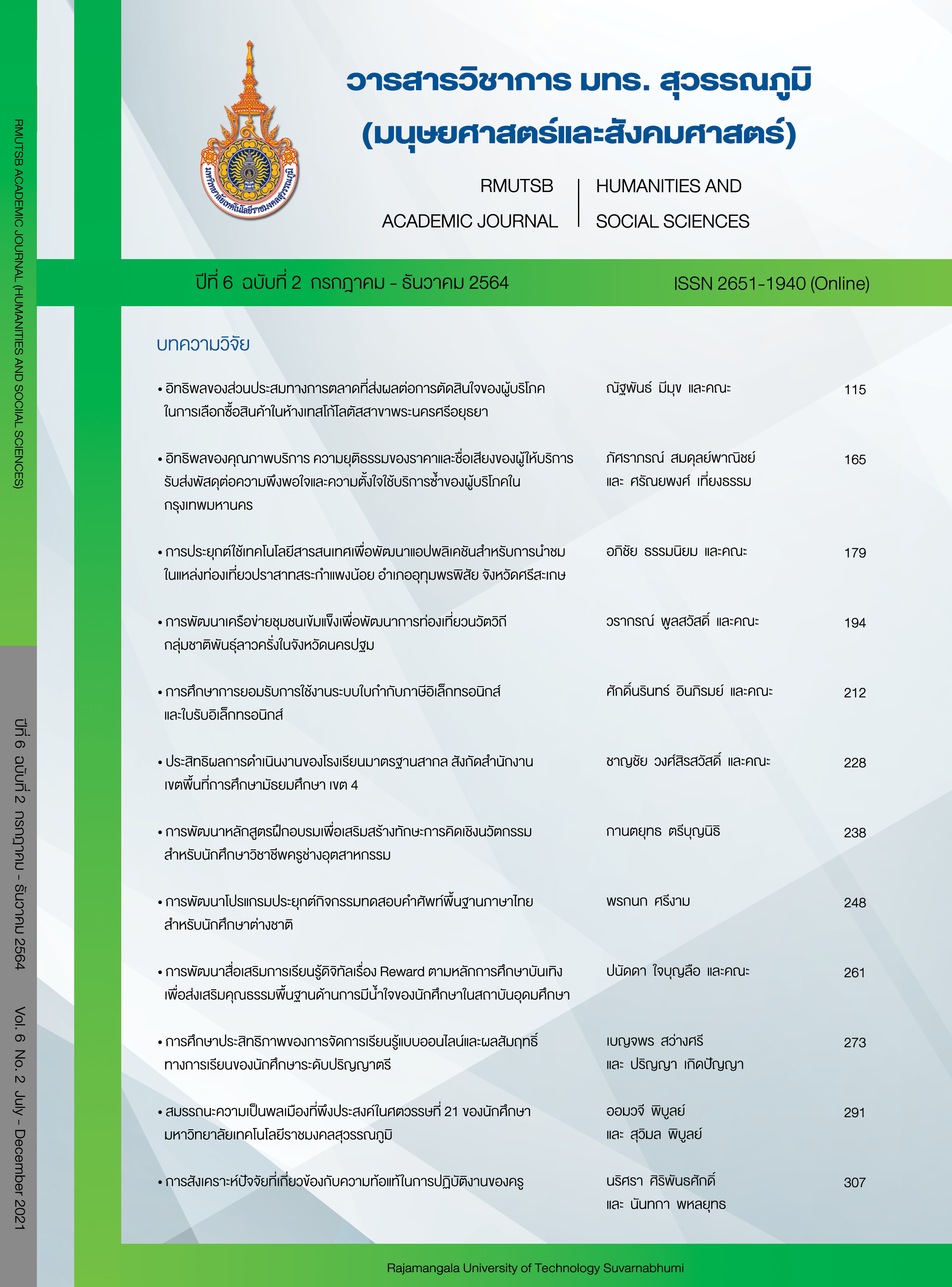Study of the effectiveness of online learning and the academic achievement of undergraduate students
Main Article Content
Abstract
Apart from traditional learning classroom, online learning management has become a popular tool in educational setting nowadays. The objectives of this research were to 1) investigate online learning’s effectiveness and efficiency and 2) study learners’ achievement and satisfaction towards online learning management. The samples used in this study were from 37 first-year undergraduates studying at Faculty of Business Administration and Information Technology in Suphan Buri, Rajamangala University of Technology Suvarnabhumi. The study was conducted during the 1st and 2nd semester in academic year 2020. The instruments used under this study were the Learning Management Plans that were used with Google Classroom, the achievement test, and satisfaction evaluation forms toward Learning Management Plans with Google Classroom. The results showed that 1) the efficiency of online learning management was 66.75/ 67.90, 2) the effectiveness of online learning management was 0.38, 3) student’s self-direct learning was at a moderate level. (=3.98, S.D.=0.87), 4) the students’ academic achievement who received online learning management did not meet the required criteria, and 5) learners’ satisfaction towards the online learning management was at the highest level (
=4.51, S.D.=0.54).
Article Details
References
Adel, A., & Dayan, J. (2021). Towards an intelligent blended system of learning activities model for New Zealand institutions: an investigative approach. Humanities and Social Sciences Communications, 8(1), 1-14.
Baig, M. A. (2011). A critical study of effectiveness of online learning on students' achievement. Journal of Educational Technology, 7(4), 28-34.
Bloom, B. S. (1956). Taxonomy of educational objectives, the classification of educational goals–handbook I: cognitive domain. London: Longmans.
Brookfield, S. D. (2009). Self-directed learning. In R. Maclean, & D. Wilson (eds.), International Handbook of Education for the Changing World of Work (pp. 2615-2627). Dordrecht: Springer.
Charters, W. W., & Good, C. V. (1945). The dictionary of education. The Phi Delta Kappan, 27(1), 5-7.
Clinefelter, D. L., & Aslanian, C. B. (2015). Online college students 2015: Comprehensive data on demands and preferences. Louisville, Kentucky: Learning House.
Dhawan, S. (2020). Online learning: A panacea in the time of COVID-19 crisis. Journal of Educational Technology Systems, 49(1), 5-22.
Flores, R. (2015). Impact of technology on teaching and learning practices at high-technology use K-12 schools: A case study (Doctoral dissertation). University of Southern California.
Gagne, R. (1985). The conditions of learning (4th ed.). New York: Holt, Rinehart & Winston.
Good, C. V., & Merkel, W. R. (1973). Dictionary of education. New York: McGraw-Hill.
Gopal, R., Singh, V., & Aggarwal, A. (2021). Impact of online classes on the satisfaction and performance of students during the pandemic period of COVID 19. Education and Information Technologies, 26, 6923-6947.
Joshua, S. (2021). Introductions to online teaching and learning. Retrieved 16 May 2021, from www.wlac.edu/online/documents/otl.pdf.
Jossberger, H., Gruwel, S. B., Boshuizen, H., & Van de Wiel, M. (2010). The challenge of self-directed and self-regulated learning in vocational education: A theoretical analysis and synthesis of requirements. Journal of vocational education and training, 62(4), 415-440.
Kintu, M. J., Zhu, C., & Kagambe, E. (2017). Blended learning effectiveness: the relationship between student characteristics, design features and outcomes. International Journal of Educational Technology in Higher Education, 14(1), 1-20.
Lee, J. E. (2018). Children’s physical activity and psychosocial beliefs in mobile application-based physical education classes (Doctoral dissertation). University of Minnesota.
Likert, R. (2017). The method of constructing an attitude scale. In M. M. Gary (Ed.), Scaling (pp. 233-242). New York: Routledge.
MacDonal, W. J. (2015). Transformation technology: Teaching and learning at 21st century elementary school (Doctoral dissertation). University of Southern Califonia.
Mahyoob, M. (2020). Challenges of e-learning during the COVID-19 pandemic experienced by EFL learners. Arab World English Journal, 11(4), 351-362.
Mehrens, W. A. L., & Lehmann, I. J. (1973). Measurement and evaluation in education and psychology. New York: Holt, Rinehart and Winston.
Network of 38 Rajabhat Universities. (2021). An opinion survey on the situation of the COVID-19 “Online teaching in the situation of COVID-19”. Retrieved 16 June 2021, from https://register.kpru.ac.th/RajabhatPoll/contents/20200007/rajabhatPoll.pdf (in Thai)
Nguyen, T. (2015). The effectiveness of online learning: Beyond no significant difference and future horizons. MERLOT Journal of Online Learning and Teaching, 11(2), 309-319.
Panit, W. (2013). The creation of learning into the 21st century. Bangkok: Siam Commercial Bank Foundation. (in Thai)
Pei, L., & Wu, H. (2019). Does online learning work better than offline learning in undergraduate medical education? A systematic review and meta-analysis. Medical education online, 24(1), 1666538.
Pintrich, P. R. (2004). A conceptual framework for assessing motivation and self-regulated learning in college students. Educational psychology review, 16(4), 385-407.
Pipitkul, Y. (2002). How to teach mathematics. Journal of the Institute for the Promotion of Teaching Science and Technology, 30(166), 15-21. (in Thai)
Promwong, C. (2013). How to test the efficiency of material or teaching packages. Silpakorn Educational Research Journal, 5(1), 5-20.
Salem, S. O., Salem, S. F., & Sharif, K. B. (2015). The role of system sociability factor in modeling learning management system success in university education. International Journal of Intellectual Human Resource Management, 1(2), 39-46.
Sangthong, P. (2018). Developing learning achievement and teamwork skill by project based learning integrating with online learning of information technology 6 subject for Matayomsuksa 6 students. RMUTSB Academic Journal (Humanities and Social Sciences), 3(1), 14-29. (in Thai)
Tanyarattanasrisakul, M. (2020). Curriculum development of “M30295 Mathematical Project” for Mathayomsuksa 6 students through active learning with self-directed learning. RMUTSB Academic Journal (Humanities and Social Sciences), 5(2), 249-268. (in Thai)
Verapreyagoon, J., & Channarong, W. (2020). Active learning in English for early childhood teacher course, early childhood education program. RMUTSB Academic Journal (Humanities and Social Sciences), 5(1), 114-124. (in Thai)
Wanitbancha, K. (2012). Statistics for research (6th ed.). Bangkok: Thammasarn. (in Thai)
Wayo, W., Charoennukul, A., Kankaynat, C., & Konyai, J. (2020). Online learning under the COVID-19 epidemic: Concepts and applications of teaching and learning management. Regional Health Promotion Center 9, 14(34), 285-298. (in Thai)


